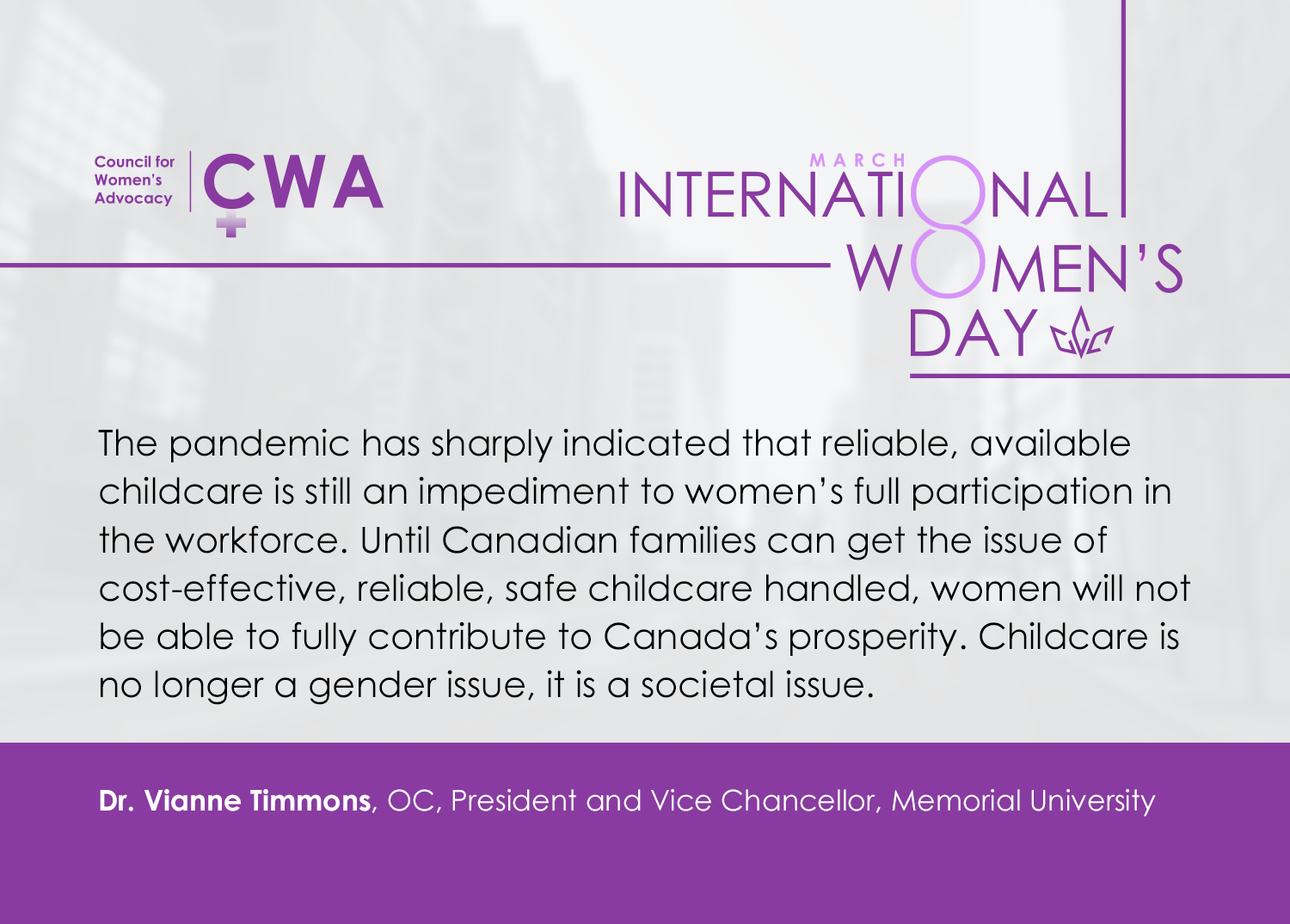Blog /
Everyone Stands to Benefit when there is Full Participation in the Economy: Dr. Vianne Timmons, OC, President and Vice Chancellor, Memorial University
Everyone Stands to Benefit when there is Full Participation in the Economy: Dr. Vianne Timmons, OC, President and Vice Chancellor, Memorial University
Canadian Chamber comments on Labour Force Survey: Jarring juxtaposition with International Women’s Week

Vianne Timmons has had a broad career in academia. As her Order of Canada citations states “Vianne has enriched her community through her bold and compassionate leadership. She is an advocate for women in leadership roles and she has given voice to and created opportunities for people with disabilities, both at home and abroad.”
Vianne grew up in a traditional family in Labrador City, where the boys did the “boy” chores — shovelling and taking the garbage out for starters. And Vianne and her sister did the “girl” chores — dishes, cooking, cleaning. A traditional family adhering to roles that most families in Canada at the time would have understood. However, her parents wanted ALL six children to go to university. So Vianne did. And now, she runs a university – her second.
In the first quarter of 2020, Vianne Timmons assumed the role of President and Vice Chancellor of Memorial University, St. John’s (NL). The university has a student population of about 19,000 and offers more than 100 degree programs. It is one of the largest universities in Atlantic Canada. Also in 2020, she agreed to sit on the Council for Women’s Advocacy – an initiative of the Canadian Chamber of Commerce.
Late last fall, we caught up to talk about the challenges Vianne has faced getting to her current position and also about the role that she hopes the Council for Women’s Advocacy can play in advancing women and their engagement in Canada’s economic future.
In speaking about some of her greatest career challenges, Vianne spoke about the unconscious bias that women face in the work world. She feels that often times women rising up the ladder face more overt criticism about what they look like, what they’re wearing, their voice or other inconsequential details. She also challenges the male clubby-feel of many work environments, where men gather for a beer or a golf tee-off time. Women still have to break through these age-old traditions, spaces and innate biases.
Regarding her own career, Timmons took a moment to apologize to today’s young women. She says the women of her generation felt they “had broken the glass ceiling” with the pathway having been groomed by the feminists of the 60s and 70s. “But really, it was harder than we pretended it to be.” She feels that women in the 90s, like herself, did not do as much as they should have for future generations.
In speaking further about this, Vianne mentions childcare. It was an issue when she was raising her family and it’s still an issue for women. The pandemic has sharply indicated that reliable, available childcare is still an impediment to women’s full participation in the workforce. Until Canadian families can get the issue of cost-effective, reliable, safe childcare handled, women will not be able to fully contribute to Canada’s prosperity. Childcare is no longer a gender issue, it is a societal issue.
Vianne is encouraged that the Chamber has taken on women’s advocacy issues via the CWA. By taking these policy pushes on, it means that it pushes women’s advocacy into the mainstream and makes these issues become an economic issue and no longer a gender issue.
Everyone stands to win when there is full human participation in the economy. She is also appreciative that the CWA has a short list of advocacy recommendations. “It’s not 300 policy changes we’re seeking — it’s a realistic five recommendations that should make it easy for government to act upon and make change happen!
The CWA is a cornerstone of the Canadian Chamber’s diversity and inclusion initiative, established to bring the voice and perspectives of women to national policies, inform the Canadian Chamber’s initiatives in advancing the gender equality agenda, and drive meaningful action to address the identified issues and barriers. The CWA will continue to explore recommendations that the federal government can implement to support women through the recovery period, alongside looking at best practices and guidance for the business community.
Other Blogs

Policy Matters: Revisiting the 3 Most Popular Topics of the Year

Vaccines: A Potential Key to Unlock Many of Canada’s Healthcare Challenges




